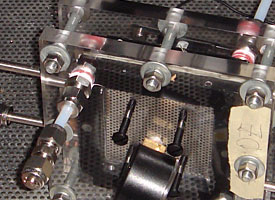 PEM fuel cells have the
benefits of quick start-up and relatively low temperature
operation, which make them the most likely candidates for
use in automobile and home applications. In order for
these fuel cells to achieve widespread adoption a number
of engineering challenges must be overcome. Two of these
challenges, the even distribution of hydrogen and air
across the membrane and the need for active cooling of the
fuel cell, are being addressed by the PEM fuel cell
research at ESC. A prototype of a novel fuel cell design
has been built and preliminary testing has yielded
promising results.
PEM fuel cells have the
benefits of quick start-up and relatively low temperature
operation, which make them the most likely candidates for
use in automobile and home applications. In order for
these fuel cells to achieve widespread adoption a number
of engineering challenges must be overcome. Two of these
challenges, the even distribution of hydrogen and air
across the membrane and the need for active cooling of the
fuel cell, are being addressed by the PEM fuel cell
research at ESC. A prototype of a novel fuel cell design
has been built and preliminary testing has yielded
promising results.
In conjunction with the electrolysis development, research
is also ongoing into the use of non-platinum catalysts.